Cats are beautiful, amazing, and complex creatures we're constantly trying to figure out. Felines have their own communication style different from that of humans and the canines they sometimes share a home with. However, this leaves us with a lot of questions starting with these three words: Why does my cat . . . ? Often, the answer to all our cat behavior queries is "to communicate with you." But, communicate what? It's up to us to decode the message.
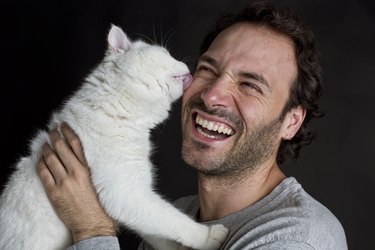
Video of the Day
1. Why does my cat lick me?
Most cats groom themselves frequently, so licking is associated with care and cleaning. Mother cats groom kittens, and some adult cats even groom each other. Generally, for cats, licking is a nurturing activity. Therefore, if your cat licks you, whether on your hand or face, it's their way of showing affection.
Video of the Day
In addition to expressing affection, licking is also a sign of acceptance or marking territory. Either way, your cat is creating a social bond or acknowledging you as a trusted member of their pride. While that sandpaper tongue can be rough and uncomfortable, refusing the gesture might be interpreted as a slight.
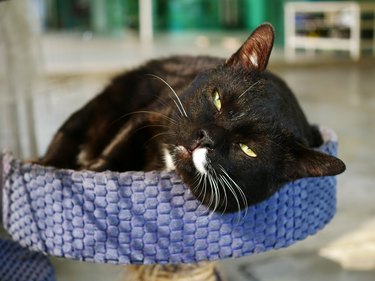
2. Why does my cat stare at me?
Cats are hunters and have the ability to stare intensely without blinking. There are many reasons why a cat might stare at you. But usually, it's curiosity, familiarity, or to make a connection. Consider your cat's entire body language when trying to determine the meaning of their gaze.
If your cat is calm, relaxed, and staring at you then slowly blinks, that's a sign of affection. Return a cat's gaze with a soft slow blink. Slow blinking expresses love and trust, but returning a prolonged intense stare might convey aggression.
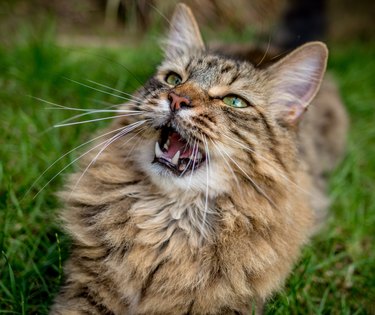
3. Why is my cat meowing so much?
Cats are naturally quiet creatures and don't often meow to communicate with each other. However, domestic cats have learned that people are vocal, and we respond to sound. Therefore, cats meow occasionally to get human attention. Some breeds, such as Siamese and Orientals, are known to be vocal cats.
However, if your cat is mewing excessively, and that's out of character for them, then something is likely wrong. Determining why they want your attention can be challenging. Cats can meow excessively because they are hungry, sick, hurting, or scared. Veterinary attention is likely necessary if the crying continues after they get your attention.
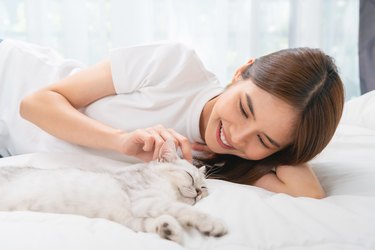
4. Why does my cat sleep on me?
A cat sleeps on you to feel comfortable and protected. Animals are vulnerable when sleeping. Therefore, they need a safe place to curl up, and you are a source of security — and heat. Cats like to be warm.
Cats sleep with those they trust, just like kittens in a litter pillow or pile on each other when sleeping. So, consider it a compliment if your cat snuggles under your chin or curls up on top of the comforter. Then try not to move all night.
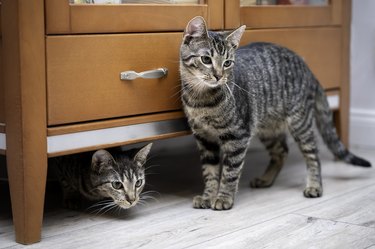
5. Why does my cat follow me everywhere?
There are two answers to the question "Why does my cat follow me?" and both answers depend on frequency. If it's common for your cat to follow you from room to room, and it's part of their routine, then they likely want to be with you. They miss you and want to know where you are, or they might be bored and need some attention.
However, if following you is unusual behavior and not something your cat often does, it could mean something is wrong. Your cat might follow you because they are hungry and anticipating dinner time or are ill, scared, or insecure. Further investigation is required in those cases.
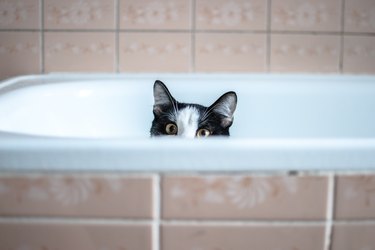
6. Why does my cat follow me to the bathroom?
The reason your cat follows you to the bathroom is either complex or a mystery, depending on who you ask. Essentially, we don't know why a cat guards people in the bathroom, but we do know a lot of them do it. So, we speculate.
Some suggest cats can experience separation anxiety, so they follow you into the bathroom to find you. But most likely, your cat likes you and when you are "indisposed,'" they have easy access to you and ask for pets. Even more likely, we unintentionally reinforce the cat's behavior by reaching out and petting them each time they join us in the loo.
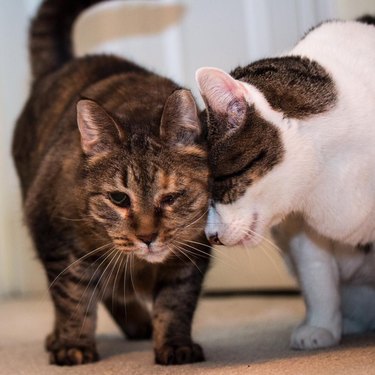
7. Why does my cat headbutt me?
Even without knowing why a cat headbutts you, it feels good when they do. Instinctively, we know this tucked or turned-to-the-side head gesture is a sign of affection and trust. Not only is your cat marking you with their scent, but saying you're a trusted member of their inner circle.
Cats have scent glands all over their bodies, including just above their eyes. When they headbutt you — also called bunting — pheromones are released making this a positive exchange. Even better, when two cats in your home headbutt each other because they are expressing trust and bonding between them.
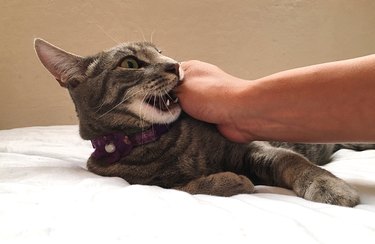
8. Why does my cat bite me when I pet her?
We've all been there: during a nice petting session, your cat suddenly nips seemingly for no reason. Some call these love bits, but they aren't so much an expression of love as a communication to stop. Cats aren't subtle. When they've had enough, they let you know. No offense is intended, so simply stop petting and don't reprimand the communication.
Similarly, you might ask, "Why does my cat lick me then bite me?" Whether your cat bites or nips after an extended petting or licking session, the meaning is the same. Your cat is saying she's had enough and might even be overstimulated. Two cats will also often end a seemingly friendly grooming session in a similarly aggressive manner.
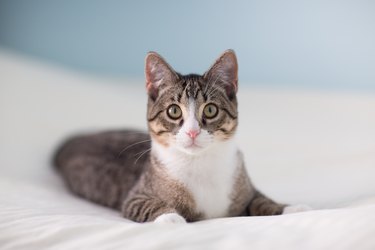
9. Why does my cat pee on my bed?
While we might call it an accident, a cat peeing on your bed is usually intentional. When you've been away for longer than they like or something in the home has changed, such as the addition of a new guest, cats often express displeasure by peeing or even pooping where they know we'll find it.
However, if you haven't been away or created any cause for stress, there might be a medical reason why a cat pees on your bed. Peeing outside the litter box can be a symptom of a bladder or urinary infection, diabetes, or even kidney disease. Definitely, seek veterinary advice in this circumstance because those medical issues are serious.
10. Why does my cat chirp and chatter?
Not all cats chirp or chatter often, but when they do, it's amusing. We're used to hearing cats meow and purr, but that funny repetitive teeth chattering or chirping sound is an indication of excitement. Specifically, hunting excitement, and it's something both domestic and wild cats do.
Our pet cats often display this chirping behavior while intensely staring out the window. Birds or other prey is likely their focus, and chirping is a natural response to this stimulation. Chirping for a short time is nothing to be concerned about, but if it evolves into prolonged chattering, your cat might be over-stimulated. In that case, distract them with a toy, but not a pet or touch.